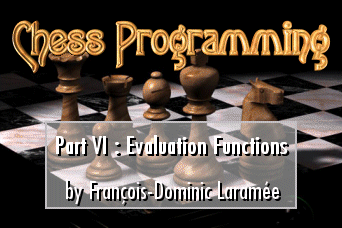11/10 - 11/12 @ Montréal, Canada
12/5 - 12/7 @ Shanghai, China
12/24 - 12/27
2/28 - 3/4 @ San Francisco, CA
More events...
2406 articles in the reference section.
Help us fight cancer!
Join SETI Team GDNet!

|
Picking the Right WeightsNow that we have identified the features we would like to measure, how do we assign relative weights to each? That, my friends, is a million-dollar question. People can (and do) spend years fiddling with the linear combination of features in their evaluation functions, sometimes giving a little more importance to mobility, sometimes de-emphasizing safety, etc. I wish there were an absolute solution, but there isn't. This is still very much a matter for trial and error. If your program plays well enough, great. If not, try something else, and play it against the old version; if it wins most of the time, your new function is an improvement. Three things you may want to keep in mind:
Next MonthWell, there ain't no next month. This is it. If I wanted to drag this series even longer, I could write about opening books, endgame libraries, specialized chess hardware and a zillion other things. I could, I could. But I won't. Some of these topics I reserve for the book chapter I will be writing on this very topic later this Fall. Others I just don't know enough about to contribute anything useful. And mostly, I'm just too lazy to bother. Still, I hope you enjoyed reading this stuff, and that you learned a useful thing or two or three. If you did, look me up next year at the GDC or at E3, and praise me to whomever grants freelance design and programming contracts in your company, will ya? Cheers! François Dominic Laramée, October 2000
|